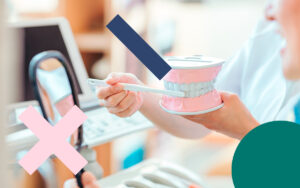Calcium is one of the fundamental minerals for the health of our body and the development of many of the structures that make it up. Surely you have already heard about the importance of calcium for teeth and bones, but exactly how does the body assimilate this mineral from the diet?
Along with good oral hygiene, dental experts recommend following a balanced diet rich in all types of nutrients. Specifically, calcium is an essential mineral for teeth, and its deficiency could be related to multiple common oral problems.
What is calcium and why is it so important for dental health?
Calcium is one of the most abundant minerals in the human body. Its presence is more than evident in the skeleton, since it is part of the bone tissue, cartilaginous tissue, and also others such as muscles or tooth enamel.
Where does this calcium come from? Most of it comes from the diet , specifically from foods rich in this mineral such as dairy products, nuts, seeds, fish, shellfish, legumes and vegetables.
In a healthy and balanced diet it is necessary to include foods rich in calcium, as well as other minerals and vitamins that intervene in its correct assimilation. Only in this way is it possible to store and replace the amount of calcium that the body needs to maintain optimal health and allow the different tissues to fulfil their function.
And how does all this influence the health of the mouth and teeth? Well, precisely in the formation and maintenance of structures as important as the maxillary bone, the mandibular bone, the teeth and the enamel that covers them for their protection.
How are teeth remineralised?
In addition to bones, teeth are another of the body’s organs that have the highest calcium content. This is not only found inside the tooth, but also as part of the enamel, the tissue that protects it against attack by various external agents.
On a daily basis, tooth enamel can be affected by mechanical wear and attack by oral bacteria responsible for cavities . Through a process called demineralization, the enamel loses thickness, and can break or be destroyed to a large extent.
To prevent this from happening, the opposite effect must be achieved, the remineralization of the teeth. Naturally, calcium and phosphates from saliva are deposited in the damaged areas, recovering the protective layer that the tooth has lost.
In this tooth remineralization process, fluoride comes into play, another very important mineral in the deposit and maintenance of calcium in the body. In addition to the fluoride found in foods, the use of fluoridated toothpastes and mouthwashes is a complement to consider for the protection of tooth enamel.
How does calcium get into teeth and bones?
Calcium participates in many of the most important processes that occur in the human body. It helps in muscle contraction, allows correct blood clotting when an injury or haemorrhage occurs, and is also a stimulator of nerve impulses.
But where its role is most noticeable, without a doubt, is in bone tissue and dental tissue. For the body to obtain the amount of calcium necessary to maintain this tissue, it is extremely important to include foods in the diet that ensure a correct supply.
From food, and thanks to digestion, calcium passes into the bloodstream and from there to the different tissues of the body. Vitamin D favours the absorption of calcium in the intestine and therefore its incorporation and that of other minerals into bone tissue, keeping it strong and healthy.
Calcium in childhood
In the adult stage, the mineral turnover that occurs in the bones is minimal. Bone tissue hardly loses calcium, and, therefore, it is not necessary to constantly replenish it. As we get older, this process goes into a kind of resting state, and the most important thing is simply to maintain correct bone density.
But what happens in the childhood growth stage? Children’s skeleton and teeth are constantly growing. It is for this reason that calcium is an essential and essential mineral in the diet of the little ones.
The recommended calcium intake increases throughout life from minimum values in the new-born to a maximum peak in adolescence, then remaining stable when reaching adulthood.
From the emergence of baby teeth , during tooth replacement in children, and the subsequent formation of permanent teeth, calcium is one of the key nutrients for oral health.
For children’s oral care, there are specific hygiene products that adapt to the needs of children at each stage, helping in the most critical moments when the risk of dental caries formation is greatest.
Signs of calcium deficiency in the teeth
The deficiency of calcium in the body is known as hypocalcaemia. This can appear at any age, but it is especially delicate during childhood and in old age, when the body does not have sufficient capacity to regulate the deposits of this mineral.
Calcium deficiency is associated with a series of symptoms that appear especially in the mouth. The first ones affected by hypocalcaemia are the teeth, with a greater probability of suffering from cavities, weak tooth enamel, sensitivity, or even swallowing problems.
Before reaching this point, in which the bones, teeth, and especially the tooth enamel are affected, we can intervene in different ways, ensuring an adequate level of calcium.
What is good to increase calcium in teeth?
There are two ways of supplying calcium to teeth that are important in oral health care. On the one hand, there is calcium in the diet, the most important , which ensures strong and healthy teeth, as well as good development of the jaw bones.
To do this, it is important to follow a diet rich in this mineral and vitamin D. In addition to milk, cheese, yogurt and other derivatives, it is interesting to eat fruits, vegetables, nuts and legumes, which improve the general supply of nutrients.
In the case of young children, we highlight another way to provide calcium, such as the use of oral hygiene products that strengthen enamel . The FluorKIN Calcium line is indicated for the prevention of dental caries from the eruption of the first teeth and throughout the entire childhood stage.
During the critical period of the formation and development of baby teeth and permanent teeth, FluorKIN Calcium provides the calcium and phosphorus that tooth enamel needs to strengthen itself and activate the natural remineralization process .
Calcium is also found in saliva and helps neutralize the acids that damage enamel, achieving a complete effect to keep the mouth completely healthy.
- BIBLIOGRAPHYNatural ingredients for good oral health. Professional College of Dental Hygienists of Madrid.
- Dental health: Relationship between dental caries and food consumption.








